 March 2021 in “Dermatological reviews”
March 2021 in “Dermatological reviews” Hair transplant works well, but needs more research for better results.
 December 2023 in “Communications biology”
December 2023 in “Communications biology” Targeting the HEDGEHOG-GLI1 pathway could help treat keloids.
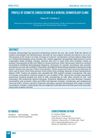 November 2019 in “Nepal Medical College journal”
November 2019 in “Nepal Medical College journal” Most people getting cosmetic dermatology are young, educated, working women with a good income, mainly concerned about wrinkles and often choosing chemical peeling.
 1 citations,
October 2021 in “Gene, cell and tissue”
1 citations,
October 2021 in “Gene, cell and tissue” Grape sap may help reduce hair loss and promote hair growth in rats.
 4 citations,
November 2020 in “Journal of Cosmetic Dermatology”
4 citations,
November 2020 in “Journal of Cosmetic Dermatology” Most Facebook posts about hair loss treatments are promotional and not medically supported, with better quality information found on YouTube.
7 citations,
August 2021 in “Pharmaceutics” Freeze-dried dexamethasone nanoparticles in a hydrogel are stable and effective for treating alopecia areata.
 17 citations,
December 2004 in “The Journal of Men's Health & Gender”
17 citations,
December 2004 in “The Journal of Men's Health & Gender” Male pattern baldness involves hormone-related hair thinning, shorter hair, and inflammation.
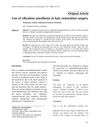 March 2018 in “Journal of Pakistan Association of Dermatology”
March 2018 in “Journal of Pakistan Association of Dermatology” Vibration anesthesia effectively reduces pain during hair restoration surgery.
 2 citations,
August 2021 in “Journal of pharmaceutical research international”
2 citations,
August 2021 in “Journal of pharmaceutical research international” Fenugreek seed extract in a nanoparticle gel could be a promising new treatment for hair loss.
 June 2021 in “Psychiatria Danubina”
June 2021 in “Psychiatria Danubina” The antidepressant escitalopram likely caused hair loss in a patient.
 1 citations,
January 2013 in “Advanced Biomedical Research”
1 citations,
January 2013 in “Advanced Biomedical Research” Men with more severe hair loss had a lower risk of schizophrenia, but hair loss and testosterone levels were not linked.
 1 citations,
September 2015 in “Clinics in Dermatology”
1 citations,
September 2015 in “Clinics in Dermatology” The guide helps doctors diagnose hair problems by suggesting a thorough patient history, physical exams, and various diagnostic tools.
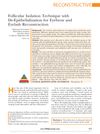 12 citations,
September 2012 in “Plastic and Reconstructive Surgery”
12 citations,
September 2012 in “Plastic and Reconstructive Surgery” Adding de-epithelialization to the follicular isolation technique improves hair transplant results for eyebrows and eyelashes.
 26 citations,
May 2015 in “Lasers in Surgery and Medicine”
26 citations,
May 2015 in “Lasers in Surgery and Medicine” Laser treatment helped regrow hair in mice by activating a key growth pathway.
 19 citations,
January 2007 in “Journal of medical investigation”
19 citations,
January 2007 in “Journal of medical investigation” GFP transgenic mice help study cell origins in skin grafts.
 30 citations,
March 2015 in “Clinical Endocrinology”
30 citations,
March 2015 in “Clinical Endocrinology” Young women with high male hormone levels or PCOS often feel more psychological distress and have a lower quality of life.
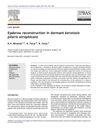 6 citations,
July 2011 in “Journal of Plastic Reconstructive and Aesthetic Surgery”
6 citations,
July 2011 in “Journal of Plastic Reconstructive and Aesthetic Surgery” Eyebrow reconstruction using hair follicle grafts was successful in a man with a benign hereditary disorder affecting his eyebrows.
 November 2020 in “Holistic Nursing Practice”
November 2020 in “Holistic Nursing Practice” COVID-19 can cause hair loss, loss of taste and smell, skin changes, and eye problems.
 1 citations,
March 2015 in “Journal of Visualized Experiments”
1 citations,
March 2015 in “Journal of Visualized Experiments” Researchers developed a new, precise method to measure hair loss in mice using image analysis.
 7 citations,
April 2012 in “Clinical investigation”
7 citations,
April 2012 in “Clinical investigation” Transdermal testosterone can improve sexual desire in postmenopausal women but lacks long-term safety data and is not FDA-approved for this use.
 1 citations,
April 2022 in “The Egyptian Journal of Hospital Medicine ”
1 citations,
April 2022 in “The Egyptian Journal of Hospital Medicine ” Fractional laser therapy may help regrow hair in alopecia areata.
 10 citations,
January 2012 in “International Journal of Trichology”
10 citations,
January 2012 in “International Journal of Trichology” The study found no link between anxiety, vitamin B12, folate, TSH, ferritin, zinc levels, and trichodynia in telogen alopecia patients.
1 citations,
February 2023 in “Ibrain” Black cumin and its nanoformulations show promise in treating neurodegenerative diseases.
 7 citations,
February 2022 in “JAAD International”
7 citations,
February 2022 in “JAAD International” COVID-19 may be linked to hair loss or worsening of hair loss in some people.
 50 citations,
December 2010 in “Bjog: An International Journal Of Obstetrics And Gynaecology”
50 citations,
December 2010 in “Bjog: An International Journal Of Obstetrics And Gynaecology” South Asian women with PCOS experience more psychological distress and have a poorer quality of life, especially in social relationships, with hirsutism affecting them more than obesity.
 11 citations,
September 2022 in “The Journal of Rheumatology”
11 citations,
September 2022 in “The Journal of Rheumatology” Skin problems are common in lupus patients and should be treated early to prevent worsening.
 2 citations,
April 2022 in “Indian Journal of Dermatology, Venereology and Leprology”
2 citations,
April 2022 in “Indian Journal of Dermatology, Venereology and Leprology” Platelet-rich plasma is a promising and safe treatment for increasing hair density and thickness in women with chronic telogen effluvium.
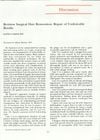 1 citations,
July 1999 in “Plastic and Reconstructive Surgery”
1 citations,
July 1999 in “Plastic and Reconstructive Surgery” The article discusses how to fix bad results from hair restoration surgery, with different doctors suggesting methods like adding more grafts, moving transplanted hair, or using smaller grafts.
 29 citations,
December 2019 in “Stem Cells Translational Medicine”
29 citations,
December 2019 in “Stem Cells Translational Medicine” Fully regenerating human hair follicles not yet achieved.
 14 citations,
February 2018 in “Psychoneuroendocrinology”
14 citations,
February 2018 in “Psychoneuroendocrinology” Mice lacking steroid 5α-reductase 2 show less aggression and better impulse control.




























